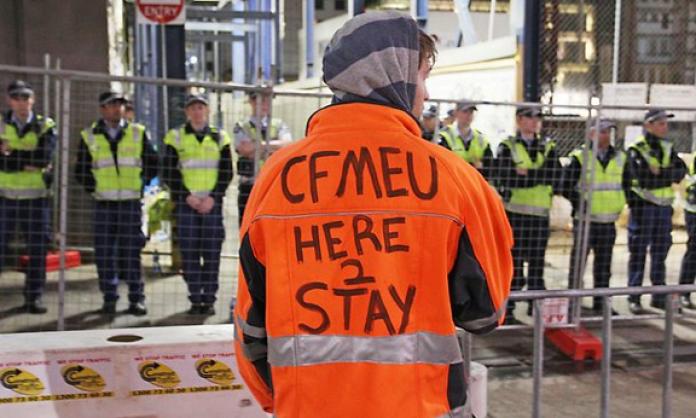Turnbull’s government feels more like Abbott’s every day. For all their promise, flashy suits and emotional intelligence have failed to secure greater support for cuts and corporate handouts.
The government remains paralysed by the fear of a backlash from workers should it attempt to implement the agenda of its big business backers. Turnbull has even pioneered his own version of the “captain’s call”, announcing a “once in several generations” tax reform one day, only to scrap it unceremoniously the next.
What passes for vision on the part of the Turnbull government fits between two cross-hairs, and is aimed squarely at the country’s most militant union. Whipping up hostility to the Construction, Forestry, Mining and Energy Union looks set to be the Liberals’ game plan going into this year’s election, with Turnbull committing to a double dissolution election in July should the bill to reinstitute the Australian Building and Construction Commission, and the associated Registered Organisations Bill, be rejected by the Senate.
There is real potential for the union movement to hit back against the government and rally people behind a workers’ rights agenda.
Both bills aim to reduce the power of the CFMEU and the “high level of disputation in [the construction] sector” in order that the construction bosses make more money out of workers forced to work harder for less.
It is of no consequence to the Liberal Party that an average of 36 construction workers die at work each year according to Safe Work Australia, or that the same number are seriously injured every day due to bosses cutting corners on hard-won safety provisions.
As CFMEU national secretary Dave Noonan has pointed out, workplace relations minister Michaelia Cash has failed to express even token concern about this in her many speeches to parliament about the supposed bad behaviour of the CFMEU.
Nor does the government seem the slightest bit perturbed by data released by the tax office in March, which suggests that evading tax is routine for the wealthy, 56 millionaires paying absolutely no tax at all and many more reporting a taxable income below the tax-free threshold.
Instead, the government is campaigning to hand more public money to the rich via further reductions in company tax rates. Cabinet secretary Arthur Sinodinos argued last month that cutting company tax will “encourage investment”, and Turnbull has previously expressed a desire to reduce it by 5 to 10 percent.
Meanwhile, essential diagnostic services are privatised, students are being forced to pay more to access higher education, and the cost of housing continues to skyrocket – not because there are no homes available for people to live in, but because profiteering investors take advantage of government incentives to leave properties empty, creating artificial shortages.
A recent study by researchers at UNSW has revealed that 90,000 residential properties in Sydney are currently empty because negative gearing means such an arrangement is “profitable and subsidised by government”. Turnbull has pledged to maintain this rort, attacking the Labor Party for daring to suggest it should be reined in.
And for all the bombast about union transparency and accountability, the government has not found a solitary harsh word for companies exposed for systematically underpaying workers. In the fast food industry, for example, a whopping 47 percent of employers have been found to be paying their workers below the minimum wage, according to the Fair Work ombudsman. It is not uncommon for workers in the industry to be paid as little as one-third of the minimum, or $6 per hour, yet the government has taken no action. While the CFMEU is “lawless” because it stands up for wages, conditions and safety on the job, the millionaires avoiding tax and bosses stealing from workers are treated as pillars of the community.
A class war election demands a class war response. Intimidating unionists and undermining hard-won working conditions will be the rallying cry of the Turnbull government going in to the next election. Defending workers’ rights must be ours.
Encouragingly, recent polling suggests that only a third of people support the reinstatement of the ABCC, with the remainder either uncommitted or opposed. It is significant that even after months of government campaigning, an entire royal commission into supposed union corruption, a media smear campaign against the CFMEU and a full mobilisation of the corporate lobby in favour of the ABCC, still the vast majority are unmoved.
This indicates that there is real potential for the union movement to hit back against the government and rally people behind a workers’ rights agenda and in defence of the CFMEU. This will require a political argument as to why working class people need strong and combative unions to resist the continued erosion of living standards, working conditions and safety.
That argument should make the connection between cuts to health care and schools and the government’s determination to weaken workers’ collective organisations that can lead resistance to such attacks. We should miss no opportunity to show that it is only the rights of CEOs, profiteering investors and the inhabitants of Point Piper that this government is prepared to stand up for.
Such a campaign could start to reinvigorate support for unions and give confidence to those who want to take a stand, including the thousands who marched against Abbott’s disastrous 2014 budget. It could help to forge connections and solidarity that will be useful in future battles, regardless of the outcome of the election.









